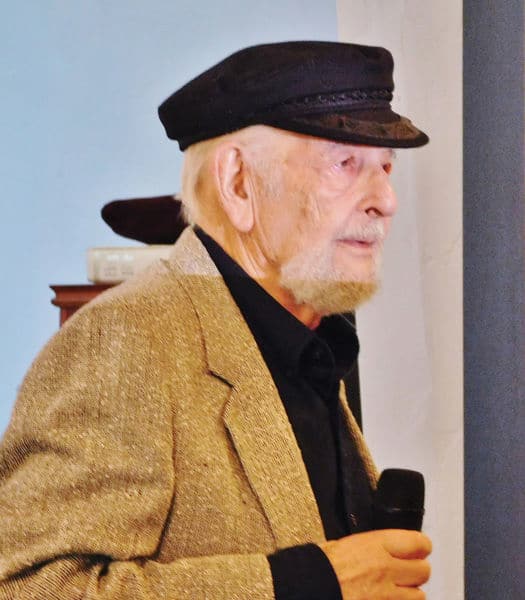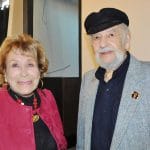Local Holocaust survivor Peter Heiman was invited by the Malibu United Methodist Church to tell his story to the community last Sunday. At the age of 91, he’s one of a dwindling number of survivors still alive 75 years after the end of WWII and in good enough health to share the stories of genocidal hate and prejudice that took place in Nazi Germany during the Holocaust.
Reverand Sandy Liddell invited Heiman to speak because, “We need to be paying attention to the forces in our culture these days… [In addition,] I’ve been reading a lot about WWII and its survivors, and I don’t know how people lived through those conditions and kept their strength, spirit and humanity. I’m in awe of how they could draw from within.”
Heiman’s Holocaust survival story wasn’t as traumatic as some from that era. Although he and his parents were Germans living in Germany, his father saw the “handwriting on the wall” early on after the Nazis came to power, and the family luckily managed to get out before the death camps were operational. But the years of hate, dislocation and then relocation to a new country were still more than what most people have to endure in a lifetime.
He posted a definition of the word “prejudice” on a screen: “An unfavorable opinion formed beforehand or without knowledge, thought or reason.”
“The Nazis kept meticulous records,” Heiman said. When he was working on his family history, he found that the death camps recorded every tattoo number, date of birth and name, but never recorded the truth about “cause of death.” Those were always listed as “pneumonia, accident or heart attack” as opposed to the real reasons: “beaten to death, starved, gassed.”
Heiman, born in 1928, said his family was not particularly observant in following Jewish traditions. They lived in Erfurt, Germany, and tried hard to assimilate. He learned Hebrew and the family celebrated Yom Kippur and Passover, but at the same time, he received visits from Santa Claus at Christmas.
His city was not particularly anti-Semitic, although there was one anti-Semitic newspaper published there. Heiman said there’s a paper with a German name now being published in the U.S. that models itself after that paper.
“In my experience, the smaller the village, the more intense the anti-Semitism,” Heiman said. “Cities had trade, foreign visitors, et cetera, that small towns did not [therefore they were more tolerant].”
As the Nazis took over Germany in the 1930s, he started seeing things like “Not For Jews” signs on park benches, meaning that Jews couldn’t sit there. In school, he sang Nazi songs.
On the night of Kristallnacht—known in English as the “night of broken glass”—Nov. 9, 1938, when he was 10 years old, the Nazis ordered over 267 synagogues burned down.
“My father realized he had to sell his shoe repair business. He had a brother and sister in New York and got a visa to go to the U.S. He saw the handwriting on the wall, unlike many others,” Heiman recounted. Heiman and his mother stayed behind in Germany temporarily.
His father had served in the German military in WWI for four years and earned an Iron Cross [medal], but that meant nothing to the Third Reich.
“They arrested all the Jewish men and put them in camps—our closest camp was Buchenwald. The message was, ‘We don’t want you in Germany anymore,’” Heiman continued. “But to get out, you needed a visa and an affidavit from the country you wanted to go to,” which weren’t easy to acquire.
The doorbell rang one night and men asked if any Jewish males were in the household. Heiman’s mother said, “Yes,” but he was only 10 years old—making him too young to take.
“And that’s why I’m here today,” Heiman explained.
Daily life included living in a house with blackout curtains, evacuation drills, food rationing, one-pot meals and Nazis collecting money at the door. A local paper later wrote an article about how well the ovens manufactured in his hometown of Erfurt were working at Auschwitz.
After a harrowing trip across the Atlantic by boat, Heiman and his mother finally made it to the U.S. Their passports had a big red “J” on the top, for “Jew.” The family settled in the Bronx, had to learn English and take all kinds of odd jobs to survive—everything from selling first aid supplies to factories to being shills at an amusement park. Over time, they found out they’d lost 20 relatives and friends to the Holocaust. Heiman eventually earned a degree in mechanical engineering in 1950, but said most Fortune 500 companies in the U.S. would not hire Jews at that time.
Heiman is still afraid to place a lighted menorah in his window during Hanukah—even though he lives in a safe neighborhood—because of antisemitism.
Rev. Liddell said his statement on that was, “Stunning… We all have to be listening and paying attention.”


